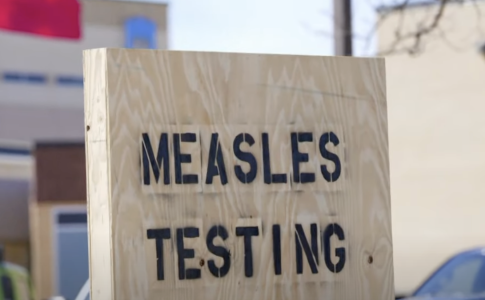Travelers take note: Why New York's latest health alert may change your travel plans
- Replies 0
Planning a trip abroad? You may want to pause and take a closer look at the latest advisory from New York health officials.
A new travel alert has been issued for 11 countries due to a sharp rise in measles cases—prompting concern, especially for older adults whose immune systems may be more vulnerable to serious complications.
As global travel rebounds, so does the risk of bringing preventable diseases across borders—and this one, officials say, could be particularly dangerous.
While most cases involve unvaccinated children, the potential for broader community spread remains real.

To get ahead of further infections, the New York State Department of Health has flagged several high-risk travel destinations.
Though only four measles cases have been confirmed in New York so far, health officials emphasize that travel-related exposure could quickly change that.
Given how easily measles spreads, even a single exposure can ripple through communities—particularly among the unvaccinated or immunocompromised.
If you’ve been exposed, find out if you're at risk here.
The MMR (measles, mumps, and rubella) vaccine remains the best protection.
One dose provides 93% immunity; two doses offer up to 97%.
But recent years have seen a dip in vaccination rates, driven by misinformation and pandemic-era disruptions.
“Measles isn’t just a rash,” said State Health Commissioner Dr. James McDonald. “It can cause pneumonia, hospitalization, and even death.”
This is especially critical for adults over 60, who may not have received the full course of modern immunizations or who may need a booster.
If you're planning to travel abroad, especially to the 11 flagged countries, officials recommend the following:
Health and Human Services Secretary Robert F. Kennedy Jr., once known for vaccine skepticism, has acknowledged the danger following the death of an unvaccinated child in Texas.
He called the MMR vaccine “the most effective way to prevent the spread of measles.”
Canada, which is included in the advisory, has seen over 600 measles cases this year—a dramatic rise compared to previous years.
Similar spikes have been reported across parts of Asia and Eastern Europe, sparking global concern about falling immunization coverage.
 Have you had to postpone travel due to health advisories? Are you unsure if you're up to date on your vaccines? Share your experiences in the comments to help others in our GrayVine community stay informed and prepared. Together, we can protect one another while continuing to enjoy the freedom and wonder that travel brings.
Have you had to postpone travel due to health advisories? Are you unsure if you're up to date on your vaccines? Share your experiences in the comments to help others in our GrayVine community stay informed and prepared. Together, we can protect one another while continuing to enjoy the freedom and wonder that travel brings.
A new travel alert has been issued for 11 countries due to a sharp rise in measles cases—prompting concern, especially for older adults whose immune systems may be more vulnerable to serious complications.
As global travel rebounds, so does the risk of bringing preventable diseases across borders—and this one, officials say, could be particularly dangerous.
Understanding the Urgency: Why Measles Is Back in the Spotlight
Health experts warn that measles cases in the US have already surpassed last year’s total—with 483 cases reported by March 26.While most cases involve unvaccinated children, the potential for broader community spread remains real.

Health experts warn that measles cases in the US have already surpassed last year’s total Image source: ABC News / YouTube
To get ahead of further infections, the New York State Department of Health has flagged several high-risk travel destinations.
The 11 Countries Listed in the Advisory:
- Canada
- Yemen
- Pakistan
- India
- Thailand
- Ethiopia
- Romania
- Afghanistan
- Indonesia
- Kyrgyzstan
- Vietnam
Though only four measles cases have been confirmed in New York so far, health officials emphasize that travel-related exposure could quickly change that.
Given how easily measles spreads, even a single exposure can ripple through communities—particularly among the unvaccinated or immunocompromised.
If you’ve been exposed, find out if you're at risk here.
Why Vaccination Matters More Than Ever
The MMR (measles, mumps, and rubella) vaccine remains the best protection.
One dose provides 93% immunity; two doses offer up to 97%.
But recent years have seen a dip in vaccination rates, driven by misinformation and pandemic-era disruptions.
“Measles isn’t just a rash,” said State Health Commissioner Dr. James McDonald. “It can cause pneumonia, hospitalization, and even death.”
This is especially critical for adults over 60, who may not have received the full course of modern immunizations or who may need a booster.
What Travelers Should Do Before Takeoff
If you're planning to travel abroad, especially to the 11 flagged countries, officials recommend the following:
- Confirm your MMR vaccination status.
- Babies over 6 months old should receive an early dose if traveling internationally.
- Be aware of symptoms for up to 3 weeks after returning.
- Avoid contact with individuals who appear ill.
The Human Toll—and the Call for Caution
Health and Human Services Secretary Robert F. Kennedy Jr., once known for vaccine skepticism, has acknowledged the danger following the death of an unvaccinated child in Texas.
He called the MMR vaccine “the most effective way to prevent the spread of measles.”
Canada, which is included in the advisory, has seen over 600 measles cases this year—a dramatic rise compared to previous years.
Similar spikes have been reported across parts of Asia and Eastern Europe, sparking global concern about falling immunization coverage.
Key Takeaways
- New York State health officials have issued a travel advisory for 11 countries amid an increase in measles cases in the United States.
- The majority of domestic measles cases have been among children who were not vaccinated with the MMR vaccine.
- Public health Commissioner Dr. James McDonald and US. Health and Human Services Secretary Robert F. Kennedy Jr. emphasized the importance of vaccination to prevent the spread of measles.
- Travellers from New York are advised to be vaccinated, watch for symptoms, and exercise caution to prevent the transmission of measles upon returning from high-risk countries.






